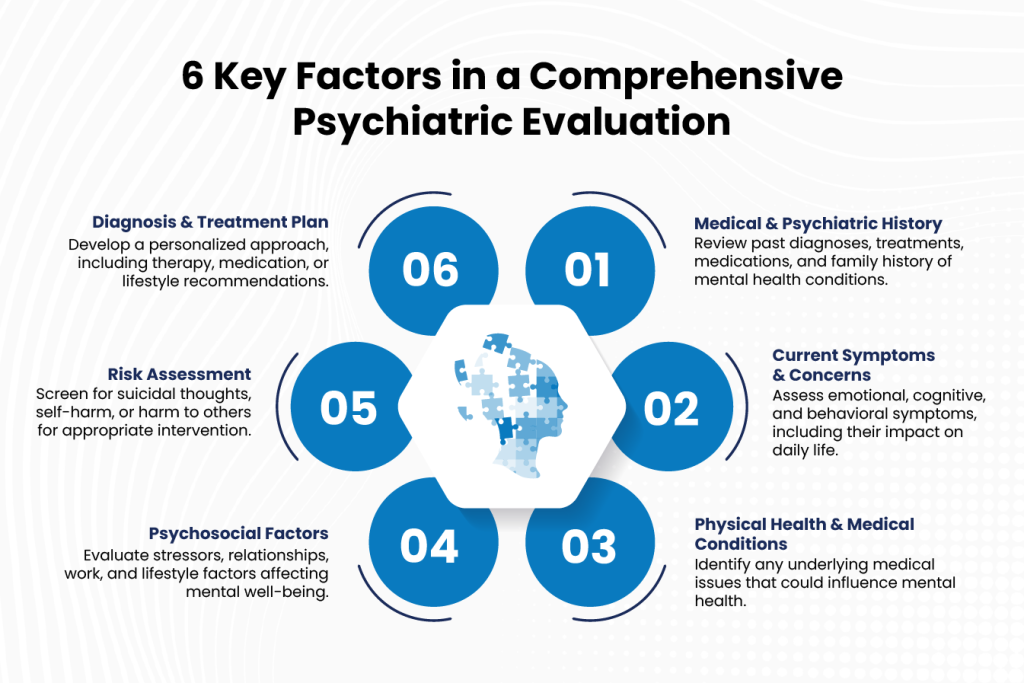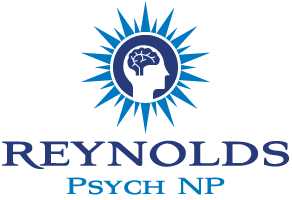A comprehensive psychiatric evaluation identifies mental health disorders and suitable treatments. It allows mental health professionals to understand the patient’s background, combined with symptom manifestation and health condition status. Understanding what happens in a psychiatric evaluation allows both patients and their loved ones to feel less anxious about the assessment process. Psychiatric evaluations provide a complete picture of the patient’s overall well-being.
Detailed Medical and Psychiatric History
A comprehensive psychiatric evaluation starts by obtaining detailed information about medical history and psychiatric records. This includes:
- Previous mental health diagnoses
- Past and current medications
- Family history of mental illness
- Medical conditions that could affect mental health
- Any history of substance use disorders
- Previous hospitalizations for psychiatric concerns
Documented historical information helps doctors determine whether psychiatric or medical elements cause identical symptoms in patients. The comprehensive medical history from a comprehensive psychiatric evaluation enables the identification of risks associated with inherited mental health disorders. A treatment plan requires greater accuracy in history collection to achieve better clinical outcomes.
Symptom Assessment and Severity
The accurate identification of medical conditions depends on a proper evaluation of symptoms. A professional, comprehensive psychiatric evaluation for adults requires the assessment of the following:
- Duration and intensity of symptoms
- Emotional triggers
- Behavioral patterns
- Impact on daily life
- Presence of hallucinations or delusions
- Sleep and appetite disturbances
Recognizing symptom severity allows tailored treatments after a comprehensive psychiatric evaluation, which guarantees optimal results. A mental health professional determines symptom severity using rating scales or questionnaires. Symptom tracking instruments enable both patient symptom progression assessment and the improvement of treatment plans over time.
Cognitive and Emotional Functioning
A comprehensive psychiatric evaluation studies both cognitive abilities and emotional stability. This involves:
- Memory and concentration tests
- Emotional regulation assessments
- Problem-solving skills analysis
- Speech patterns and thought processes
- Attention span and impulse control
- Ability to manage stress and emotions
Standardized assessment tools help mental health experts determine cognitive abilities to detect neurocognitive disorders as well as mood disturbances. Standardized cognitive evaluations in a comprehensive psychiatric evaluation assist medical professionals in diagnosing ADHD as well as dementia and schizophrenia. Emotional stability assessments help professionals understand mood disorders as well as anxiety and personality disorders to develop a complete picture of the individual’s mental state.

Social and Environmental Factors
Mental health is majorly impacted as a result of environmental elements. Clinicians consider:
- Family dynamics
- Work or academic stress
- Social support systems
- History of trauma or abuse
- Economic factors affecting mental health
- Cultural or religious considerations impacting treatment
Understanding these factors helps professionals obtain a complete picture of patients’ mental states, which guides them in creating effective treatment methods. The three core elements of biology, psychology, and society work together to shape our mental health. Professionals use a complete analysis of biological, psychological, and social factors to suggest lifestyle adaptations, therapy choices, and supportive networks for individual needs.
Risk Assessment and Safety Planning
Safety risk evaluations need to be included in a comprehensive psychiatric evaluation. Professionals assess:
- Suicidal ideation or self-harm tendencies
- Aggressive or violent behavior risks
- Substance use and its impact on mental health
- Any history of legal issues related to mental illness
- Access to weapons or means of self-harm
Safety plans and crisis intervention measures are created to ensure patient well-being in circumstances that require them. For critical patients, emergency hospitalization and intervention might be necessary. Experts assist families and caregivers in developing safety plans to create a safety net and support them during crises.
Treatment Recommendations and Follow-Up Plan
Mental health professionals use all acquired information to develop their treatment recommendations. This could include:
- Medication management
- Therapy options (Cognitive Behavioral Therapy, Psychotherapy, Dialectical Behavior Therapy, etc.)
- Lifestyle modifications such as exercise, nutrition, and sleep hygiene
- Support groups or peer counseling
- Further medical testing or brain imaging if necessary
- Regular follow-ups to track progress and adjust treatments
A properly designed follow-up plan allows for continuous patient care while treatment approaches require necessary modifications. The patient and the psychiatrist should set practical treatment objectives. Professional check-ins track patient progress and make necessary changes to medications and therapy approaches.
Related Articles:
Take the First Step With a Comprehensive Psychiatric Evaluation
A comprehensive psychiatric assessment is the initial step towards knowing and improving mental health. A professional assessment is necessary for anyone with emotional, cognitive, or behavioral issues or for someone concerned about a person in this condition. The secret to achieving a higher quality of life begins with quick intervention before symptoms worsen.
Your mental health matters. The same care needed for physical health needs professional guidance and attention when proper medical assistance is required. When you complete a complete psychiatric evaluation, you better understand your medical state and what is a comprehensive psychiatric evaluation and acquire specific treatment solutions matching your needs.
Take control of your mental wellness today. Contact a mental health expert like Reynolds Psych NP immediately to schedule a detailed psychiatric assessment. With proper support and treatment, you will be able to lead a better, more balanced life.
Get a tailored psychiatric evaluation for your mental health needs by reaching out to the specialists via phone at (262) 393-2529 or send them an email at [email protected].
Frequently Asked Questions
What is a comprehensive psychiatric evaluation?
A comprehensive mental health evaluation provides patients with both diagnosis and treatment planning. This evaluation method combines medical record assessment with symptom detection and emotional health assessment.
What happens in a psychiatric evaluation?
The clinician conducts a review of medical records and psychiatric documentation before evaluating symptoms while testing mental abilities and providing guidance for treatment.
What is psychiatric evaluation used for?
A psychiatric evaluation identifies psychiatric disorders while evaluating risk elements to construct specific treatments that suit individual requirements.
How long does a comprehensive psychiatric evaluation take?
The evaluation period typically spans sixty to ninety minutes, but extensive cases might need several sessions to complete the assessment.
Who should get a psychiatric evaluation?
People dealing with ongoing emotional together with cognitive or behavioral problems should undergo a complete psychiatric evaluation. The evaluation provides particular advantages to patients suffering from anxiety and depression or personality disorders.







